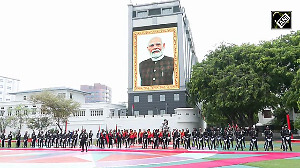America's nuclear fuel supply assurances to India are a "political commitment" and the government cannot "legally compel" US firms to sell a "given product" to New Delhi, top officials told a Congressional panel as the administration worked hard to push the Indo-US deal through the Congress before September 26.
On a day of intense grilling at an extended hearing of the Senate Foreign Relations Committee, the administration also said the US has the "same right to respond" as India had "the sovereign right to test."
"The commitments that the president (George W Bush) made that are recorded in the 123 agreement are firm, solemn commitments. The president made clear in the transmittal letter, they're political commitments," Under Secretary of State for Political Affairs William Burns replied when asked if the fuel supply assurances have no "legal effect".
There was a furore in India after President George W Bush wrote to Congress that fuel supply was not legally binding.
"They are political commitments. In the sense that we are determined to help India to try to ensure a reasonable steady supply of fuel and should disruptions arise, for example, trade disputes, a commercial firm fails to meet its requirements, then we are firmly determined to do everything we can to help in that instance," Burns said when asked if the commitments are binding on the next administration.
Acting Under Secretary for Arms Control and International Security John Rood maintained that the 123 agreement provides a legal framework. "The agreement, as a legal matter, is, as I say, only an enabling piece of legislation," he said.
"It's not a government activity to produce nuclear fuel. It's a commercial activity in the US, and we in the US government would -- could not legally compel American firms to provide fuel to India if they did not wish to do so," he said.
The agreement does not compel US firms "to sell a given product to India," Rood said in reply to queries on legal implications of the deal.
"With regard to their understanding that our actions are going to be guided by US law and will be consistent with US law, I believe the Indians do understand that," he said.
Burns said the US would keep in mind the Indian "sensitivities" on the issue of supply.
"What is very clear is that we will do everything we can to ensure that steady supply, except in extreme circumstances. And in those extreme circumstances, whether it's a test or an abrogation of a safeguards agreement, then our actions will be bound by US law. And I guess that's the clearest way that I can put it," the senior State Department official added.
On another contentious issue of India's right to test, Burns said, "Just as how India had the sovereign right to test, the United States enjoyed the same right to respond."
"We believe the Indian government intends to uphold the continuation of the test moratorium it committed to in 2005 and reiterated in its September 5 statement," Burns said.
Asked why the US did not support an automatic termination provision in the Nuclear Suppliers Group, he said, "We could not support proposals to automatically terminate the exception if India tests, because the Atomic Energy Act gives the US president the statutory authority to waive restrictions if terminating cooperation would be seriously prejudicing to achievement of US non-proliferation objectives or otherwise jeopardise the common defence and security. To do so would have tied the hands of this and every president to exercise their authority under that."
When Senator Dodd asked, "Would it be legally required for the US president, under the agreement, to help India acquire a nuclear fuel reserve sufficient to enable India to ride out any international sanctions as a result of a nuclear test?"
"What we have agreed to do is aid India in the creation of a strategic reserve. The president has made a commitment to do that. The agreement, as a legal matter, is, as I say, only an enabling piece of legislation. We in the United States government, for instance, it's not a government activity to produce nuclear fuel, it's a commercial activity in the United States, and we in the US government would -- could not legally compel American firms to provide fuel to India if they did not wish to do so," Rood replied.
Presented with a scenario of India buying some American nuclear fuel in October and then the following month conducted a test whether President Bush would feel obligated to help India find alternative fuel sources to replace the supply that would very likely cut off, pursuant to Section 129 of the Atomic Energy Act, Rood replied, "We would have to evaluate the circumstances, of course, that existed at that time. India has made a commitment, most recently reiterated just on September 5, to maintain a unilateral moratorium on nuclear testing. So we do not expect that India would conduct a nuclear test.
There are restrictions embodied in Atomic Energy Act that would require the president to make certain determination. If the president determines that nuclear cooperation with India should be terminated and, for instance, if we in the US government then move to terminate the 123 agreement, it would not be consistent with that spirit for us to encourage other countries to supply nuclear fuel if the United States did not."





